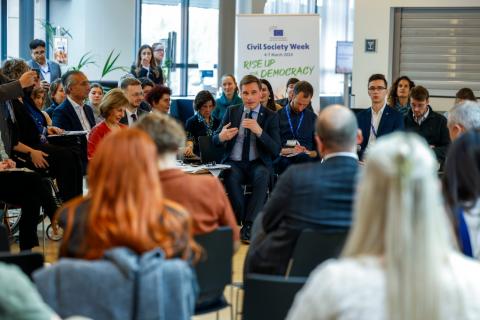European Economic
and Social Committee
Civil Society Week: European civil society sets agenda for next EU leaders
From 4 to 7 March, the European Economic and Social Committee (EESC) hosted the first-ever Civil Society Week, where over 800 representatives from civil society organisations and youth groups gathered to discuss the upcoming elections and the future of the EU. The takeaways will be incorporated into an EESC resolution in July, which will outline what civil society expects from the incoming leadership of the European Parliament and the Commission.
With its five major initiatives – including Civil Society Days, European Citizens' Initiative Day, Your Europe, Your Say! (YEYS), the Civil Society Prize, and the Journalists' Seminar – Civil Society Week aims to:
- empower citizens to engage with the EU and exercise their democratic rights;
- identify and address threats to democratic values, such as disinformation and voter apathy; and
- gather recommendations from civil society to feed into future EU plans.
The first insights into the messages formulated by civil society organisations for the new EU leaders focused notably on responsive governance, inclusive policies and a sustainable future for all Europeans.
Combating misinformation
Ahead of the European elections, youth representatives and journalists raised concerns about the rampant spread of misinformation and deepening online polarisation, stressing the need for robust legal frameworks. Civil society calls for collaboration among governments, schools and tech firms to promote digital literacy, fostering a knowledge-rich and inclusive online environment.
An economy that works for people and the planet
Civil society urged for a shift from growth-centric models to holistic approaches that prioritise well-being, prosperity and environmental limits. In line with this, youth organisations advocated for a corporate sustainability directive and proposed special taxes on environmentally harmful goods.
Participants also emphasised the EU's role in the digital transformation, urging ethical AI leadership and citizen education. These measures aim to ensure responsible economic growth and to empower citizens in navigating the evolving technological landscape.
Empowering youth
Civil society insisted that young people must be empowered to shape the future of Europe. They advocated for a 'youth test' on all EU policies to assess their impact on younger generations. In particular, youth groups proposed youth quotas for European Parliament elections to enhance representation.
Strengthening democracy
Participants called for a more resilient and inclusive democracy, emphasising structured civil dialogue at all government levels. This dialogue, coupled with capacity building, aims to strengthen civil society in EU candidate countries, fostering a safe and enabling environment for civil society to thrive in Europe.
Moving beyond the suggestion box
The week exposed the strengths and weaknesses of the European Citizens' Initiative (ECI). While acknowledging its successes, frustrations emerged over insufficient responsiveness from EU institutions. Calls were made for ECIs to elicit substantive responses, fostering stronger partnerships and empowering citizen participation through shared best practices.
Looking ahead
These recommendations will feed into an upcoming EESC resolution setting out civil society's expectations for the next European Parliament and Commission. (gb)
